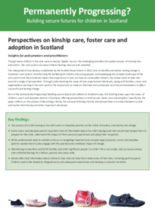Though many children in the care system may be ‘legally’ secure, the challenging and often disruptive process of moving into - and within - the care system can leave children feeling insecure and unsettled. The Independent Care Review, established by the Scottish Government in 2017, aims to identify and deliver lasting change in Scotland’s care system, transforming the wellbeing of children and young people. Acknowledging the complex landscape of the care system and the emotional impact that experience in care can have on vulnerable children, the review seeks to take into account a range of perspectives. Through understanding the views of care-experienced individuals, along with families, carers and organisations working in the care system, the review aims to make an informed and considered set of recommendations to affect successful and lasting change. Part of the Permanently Progressing? Building secure futures for children in Scotland study, this briefing draws upon the voices of children, carers and adoptive parents in Scotland, offering perspectives on kinship care, foster care and adoption. Specifically, the paper reflects on the process of becoming a family, the concept of being a family, and perspectives on contact between a child and his/her birth family and other important individuals. Key findings The process of a child moving to live with carers or adoptive parents can be a time of anxiety, uncertainty and change. Some carers and adoptive parents reported a lack of information about the child’s background that would have helped them to prepare for the child, understand the impact of their previous experiences and adapt their responses. While professionals need to maintain a focus on navigating important and complex legal processes, carers and adoptive parents needed them to also engage with the practical and emotional impact of change. Maintaining connections with birth families and other significant people in a child’s life is not simple, and can cause anxiety and conflicted feelings for children, parents and carers alike. Adults often hold information about children’s lives that can help them make sense of their lives, including painful aspects. Children need to be helped to integrate early and subsequent experiences and develop a coherent narrative.

